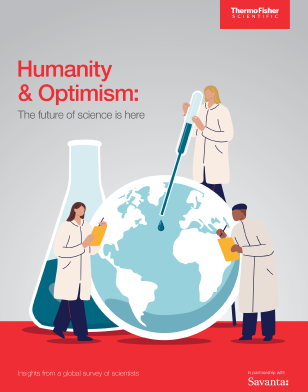Latest Podcasts

Delivering on the promise of cell therapies: Programmed immune cells attack cancer and other...
Delivering on the promise of cell therapies: Programmed immune cells attack cancer and other...

Disrupting the Status Quo: The Importance of Diversity in Clinical Trials
Disrupting the Status Quo: The Importance of Diversity in Clinical Trials
THOUGHT LEADERSHIP

Today’s optimism is tomorrow’s innovation
Scientists’ role is to move us toward a better future. But what does that future look like? What does the next generation lab look like, who is standing in it and what problems will they be solving?
Thermo Fisher Scientific partnered with Savanta, a leading market research company, to understand what professionals in Life Sciences expect the world to look like in 2030. We conducted 20 hour-long in-depth interviews and surveyed more than 600 Life Science professionals from the United States and Europe.
“It is an exciting time to be a scientist. And it’s getting better. I feel like I’m just exploring my hobby or a passion, and I get paid for it.”
Masi,Director, Biotechnology
Faced with these challenges, scientists are not afraid to tackle them, and are confident they are going to succeed:
91%
of scientist agree that Life Sciences companies should prioritize people and humanity over the products and services they provide.
76%
of scientists believe they will live to see a complete cure to most types of cancers during their lifetime
92%
of scientists say implementation of environmentally responsible R&D can be achieved by 2050.
By 2030, scientist believe the following:
88%
believe that artificial intelligence computing will have completely transformed the operation of labs.
74%
say that fewer human workers will be needed in labs because of productivity gains tied to robotics
74%
agree that by 2030, virtual labs will rival traditional ones in terms of numbers and output.
64%
say the labs of 2030 will be unrecognizable compared to right before the pandemic.



 Watch Science with a Twist | Season 2 : Episode 10
Watch Science with a Twist | Season 2 : Episode 10 






